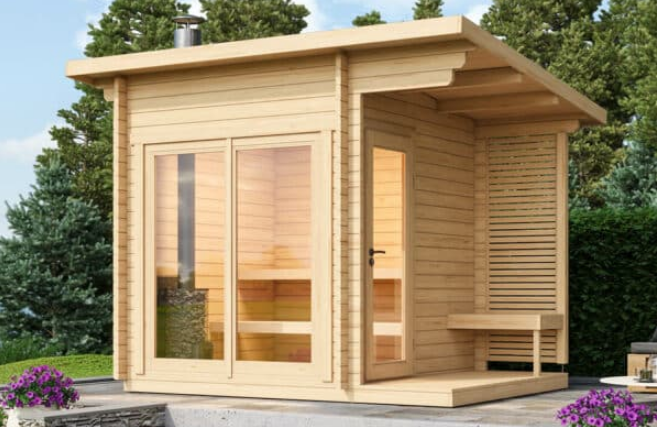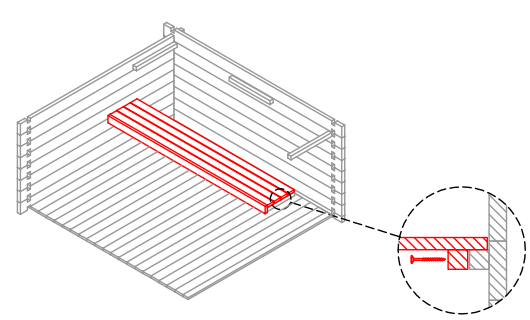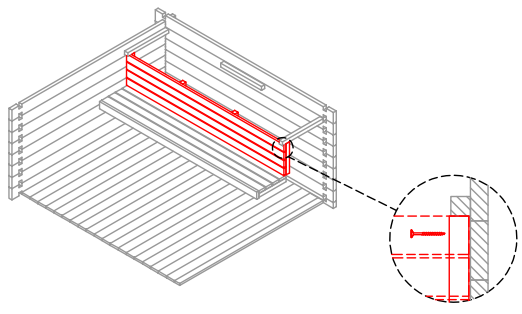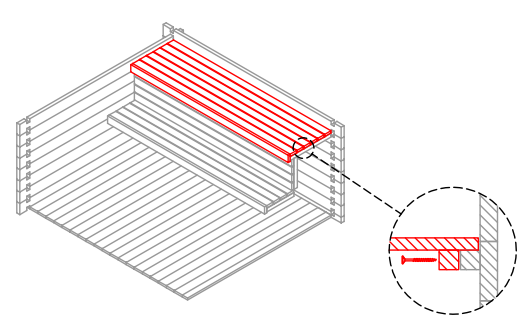
Bsaunas APL55-1 Halden-S 40 Log Sauna

HOUSE: HALDEN S 40
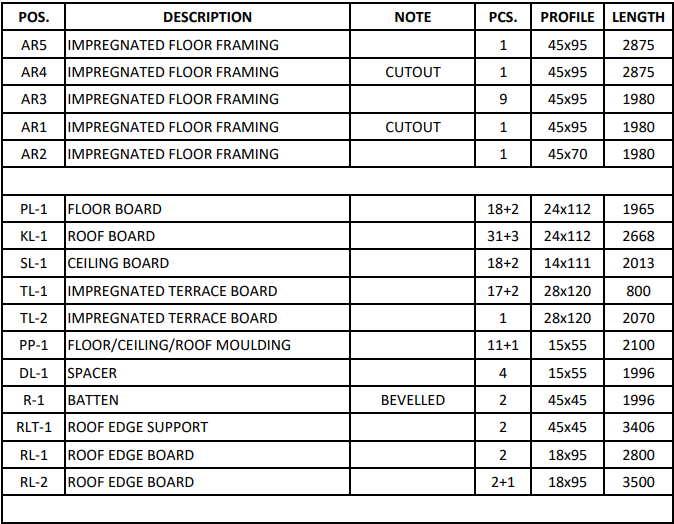

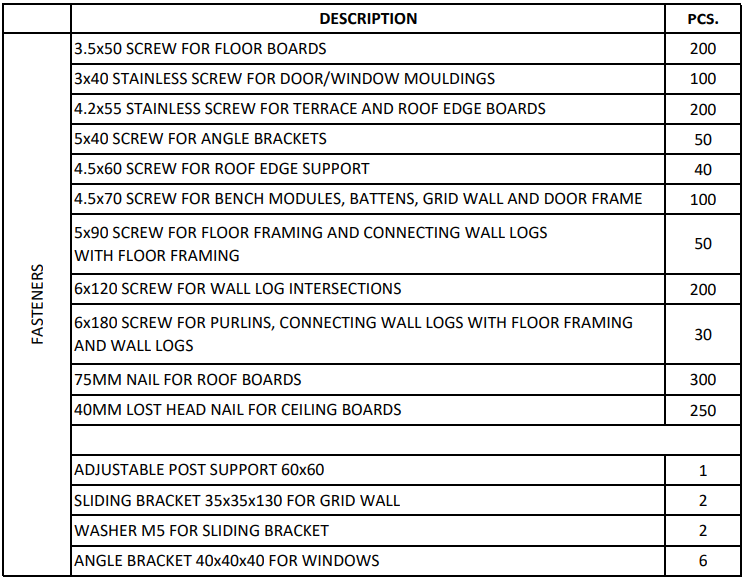
BASE PLAN

FLOOR FRAMING 45×95
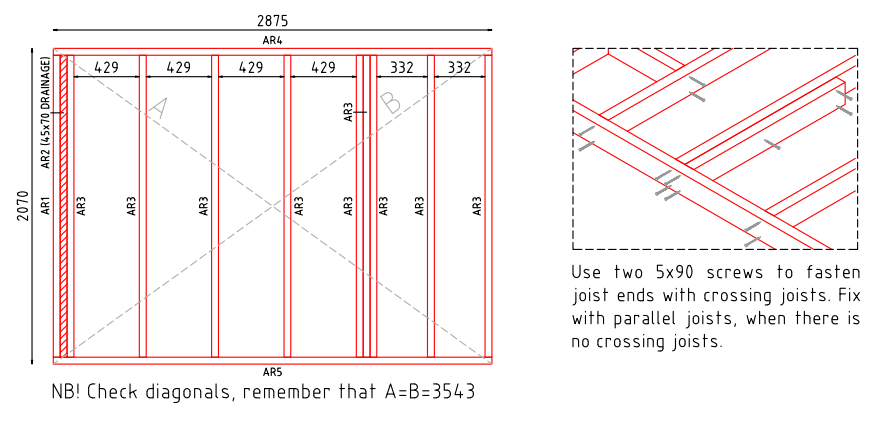
FASTENING WALL LOGS
Fasten the first row to the floor framing. Use 5×90 screws for half logs (fix those first) and 6×180 screws for full logs. It is recommended to predrill holes. If necessary, use rubber hammer and hit the block to secure the logs tightly on top of each other.
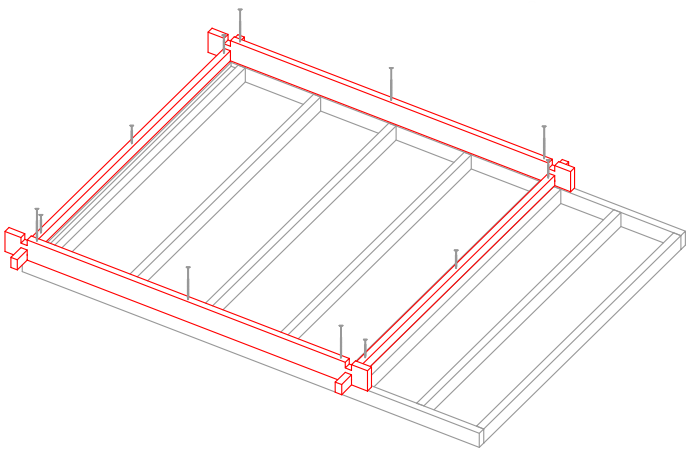
Use 6×120 screws in each intersection. Try to alternate the placement of drill holes so screws don’t end up on top of each other. It is recommended to predrill the holes.

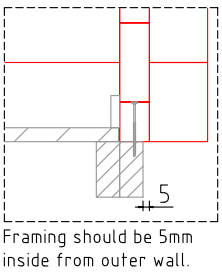
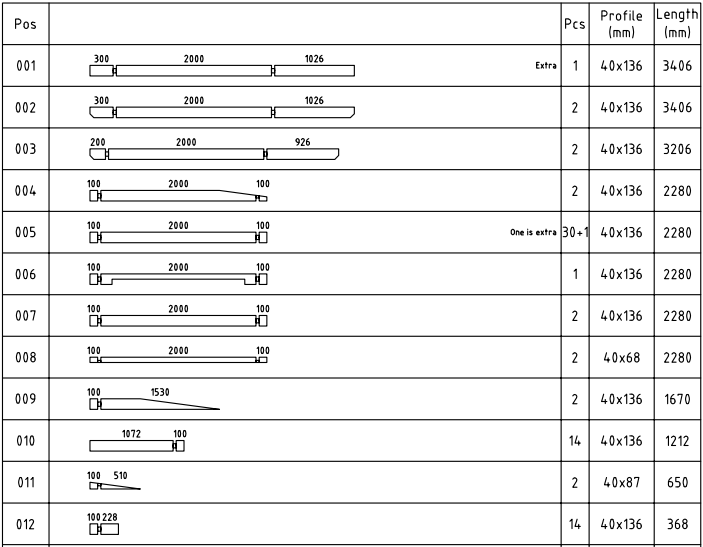
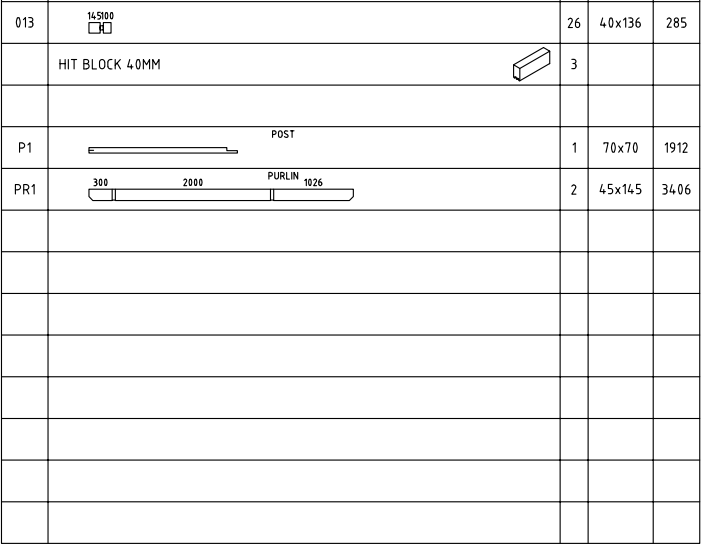
WALL A
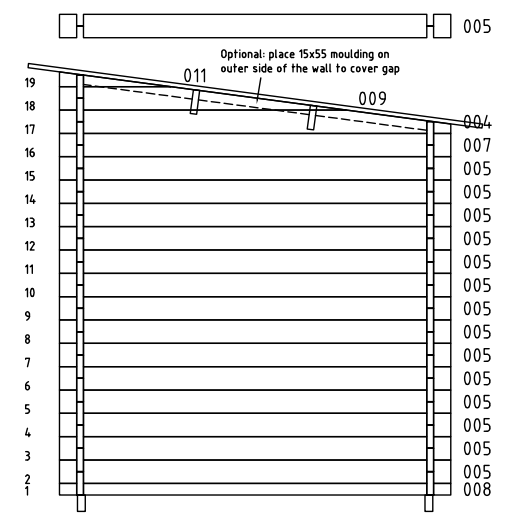
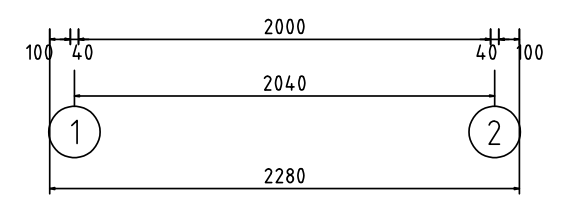
WALL B

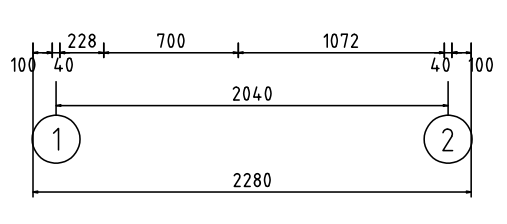
WALL 1
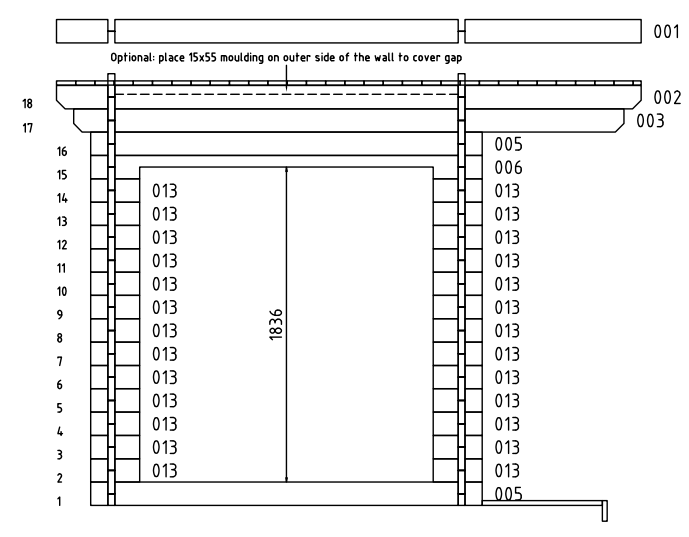
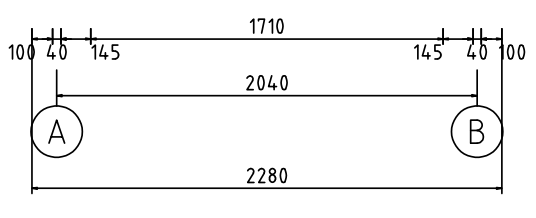
WALL 2
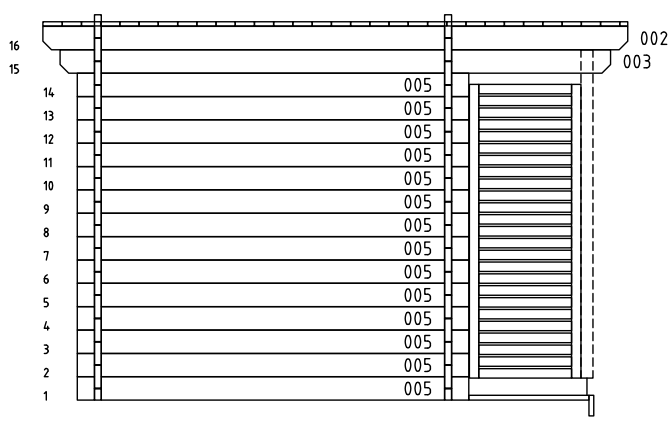
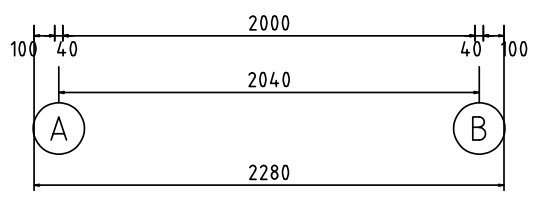
FLOOR BOARDS
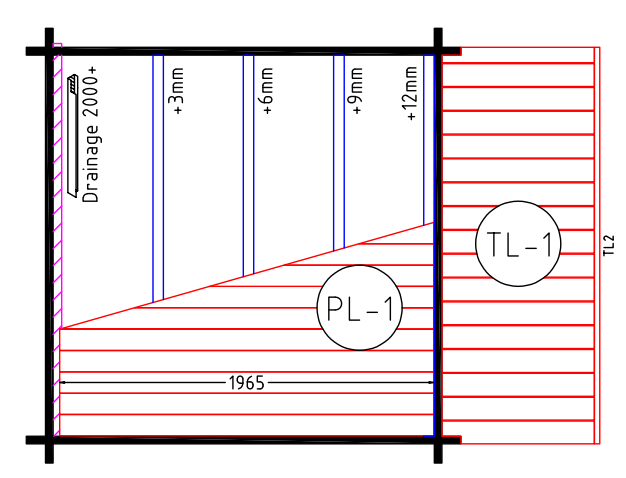
Add slope boards and drainage details before fixing floor boards.
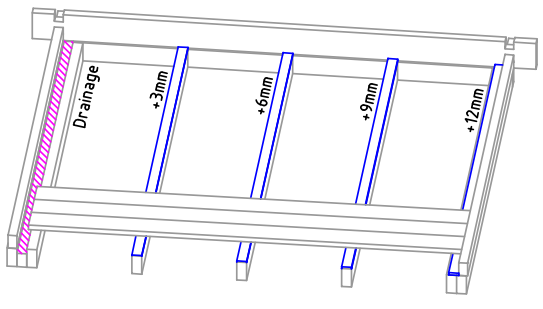
When placing drainage, fix the closed end temporarily ~Smm higher than the opened end to guarantee a slope towards the outer wall for water. After placing floor boards, fixthemt permanently with floor mouldings.
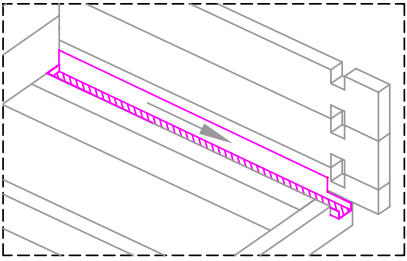
Fasten floor boards with screws from the tongue side of the board. First board should be placed ~Smm from the wall, and when cutting the last board, make sure there is a 5mm gap as well. Leave ~2mm gap between the floor board (cross-cut sides) and the walls. Lastly, fix mouldings in place.

ROOF BOARDS


FASTENING DOORS/WINDOWS
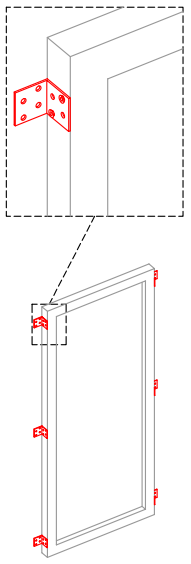
- Fasten 40x40x40 angle brackets to window jambs (3pcs for each side) with two 5×40 screws. Make sure that brackets are 3mm inside from the outer surface of the jamb, so there will be enough room for screw heads when mounting windows to walls and fixing mouldings.

- Lift the window in place and fasten the angle brackets to the wall with 5×40 screws (2pcs for each bracket).

- Fasten mouldings with 3×40 screws. Mouldings should cover about 20mm of the frame.

- Lift the door in place and fix it to the wall by screwing 4.5×70 screws through the wall to the frame .

- Fasten mouldings with 3×40 screws. Moulding coverage is about 20mm on the upper moulding and 10mm on the sides. There are no mouldings on the side of the frame.

DOOR/WINDOW MOULDINGS
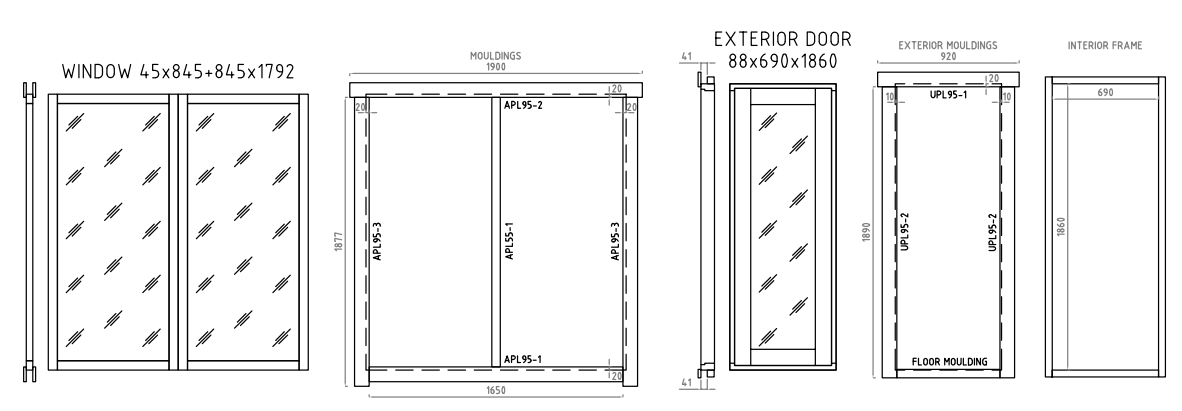
CEILING INSULATION IN SAUNA ROOM
- Fasten battens (R-1) to side walls so that they are in line with purlins. Use 4.5×70 screws.

- Place insulation sheets under purlins (use a few leftover screws from previous steps to hold sheets in place}) Tape screw holes in sheets, connection seams and perimeter with aluminium tape.

- Fasten spacers under battens/purlins with4.5×700 screws to secure insulation sheets properly in place.

- Fix ceiling boards under spacers with lost head nails (two nails for each connection). Finall,fastenen mouldings aroundthe perimeter using lost head nails.

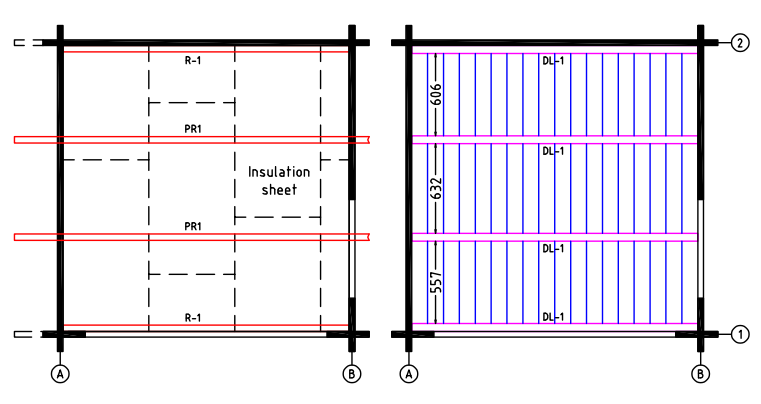
FASTENING BENCH MODULES
This is an overall manual for bench modules. You can skip some of the steps depending on the set (for example, if there is no bench skirt). Precise heights for bench supports and benches can be found on the next page.
- Fasten the bench supports with screws to the wall. Use glue between the wall and the support for a stronger connection.

- Lift modules in place and fix them to the supports on the walls. Do not install the upper module in case there is a bench skirt in the set.

- Lift the bench skirt in place, attach it to the wall from the sides and the lower bench in the middle. There should be an 8mm gap between the lower bench and bench skirt.

- Place the upper module and fix it in place as described in step two.

CROSS-SECTION OF SAUNA ROOM AND HEIGHT OF BENCH MODULES
Use 4.5×70 screws to fasten bench supports to walls and to fix benches to already fixed supports. Lower module position is approximate (can be placed
according to your preference). Outdoor bench support must be fixed at the same height as is length of the vertical supports.
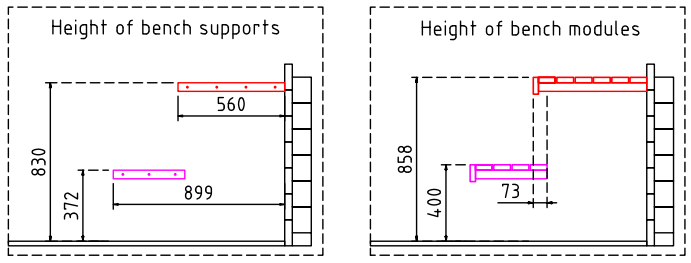
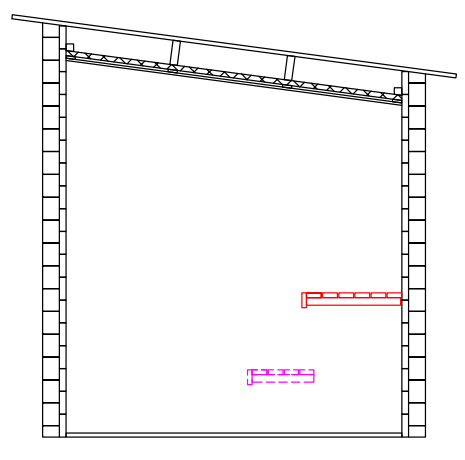
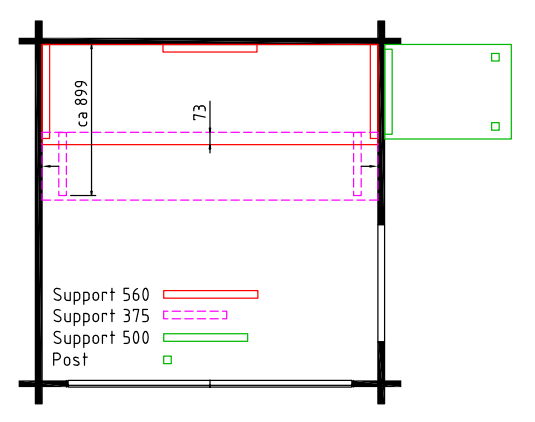
FASTENING GRID WALLS AND ADJUSTING POSTS
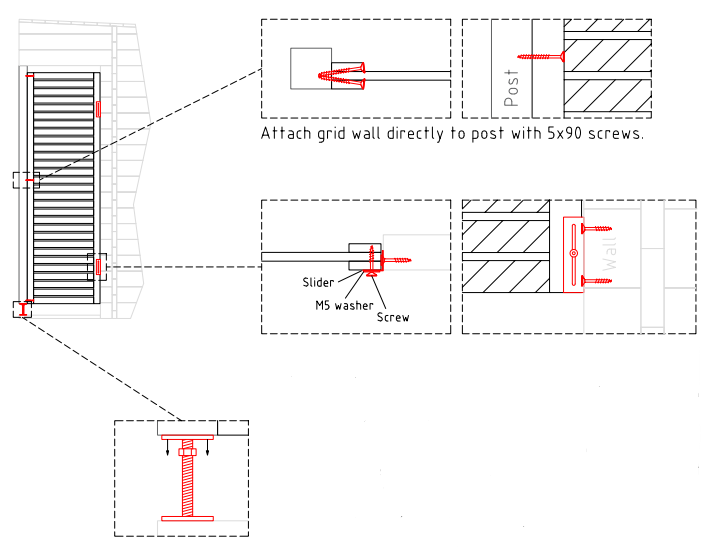
Use sliding brackets to fix the grid wall to the house. Fasten the slider to the wall logs. Leave the side with a slot on the side of the grid wall, put the MS washer between the screw and the slider. Do not fix the screw too tightly to enable the house to move differently from the grid wall. After the house is built, it is necessary to adjust the past support. Otherwise house will settle, but not the parts that are supported bythe past, and there will be gaps between wall logs. Loosenthe nut under the post and wait a little bit so the house can settle. Then turn the nut back against the plate.
Adjusting should be done once a month after the house has been built, then once every three months after half a year has passed, and afterthe first year, it is enough to adjust post supports once or twice a year.
For more manuals by Bsaunas, visit ManualsLibraryy
Bsaunas APL55-1 Halden-S 40 Log Sauna- FAQs
Q1. How do I operate the sauna?
Press the Power button on the control panel to start the heater. Adjust the temperature using the + / – buttons. The maximum temperature is 194°F (90°C).
Q2. How do I set the right sauna temperature?
For short sessions (10–15 minutes), set 60–70°C. For longer sessions (30–60 minutes), use 75–90°C. Typical use is around 150–165°F (65–74°C).
Q3. What should I do if my sauna is not heating?
Check the power supply, thermostat, wiring, heater elements, and ventilation. If the issue continues, contact a technician.
Q4. How do I reset the sauna?
Unplug the sauna from power (or turn it off at the breaker) for 30+ seconds, then restart. Ensure all cables are securely connected.
Q5. How do I clean the sauna?
Wipe benches and walls with a damp cloth or mild soap solution (avoid harsh chemicals). Leave the door open afterward for ventilation.
Q6. What is the emergency button for?
The emergency stop button shuts off the heater instantly and may trigger an alarm to alert supervising staff if connected.
Q7. Should I drink water before or after using the sauna?
Yes. Drink 16–20 oz (500–600 ml) of water before and after each session to stay hydrated. Avoid alcohol or caffeine.
Q8. Can I pour water on sauna stones?
Yes. Pouring water creates steam, increases humidity, and enhances comfort—but always use clean water in small amounts.
Q9. How often should I maintain my sauna?
Clean after each use and treat wood surfaces with oil 1–2 times a year. Regular maintenance extends sauna life.
Q10. Is it safe to use a phone in the sauna?
Not recommended. Heat and moisture can damage electronics. If necessary, use a heat-resistant waterproof case and limit use.

